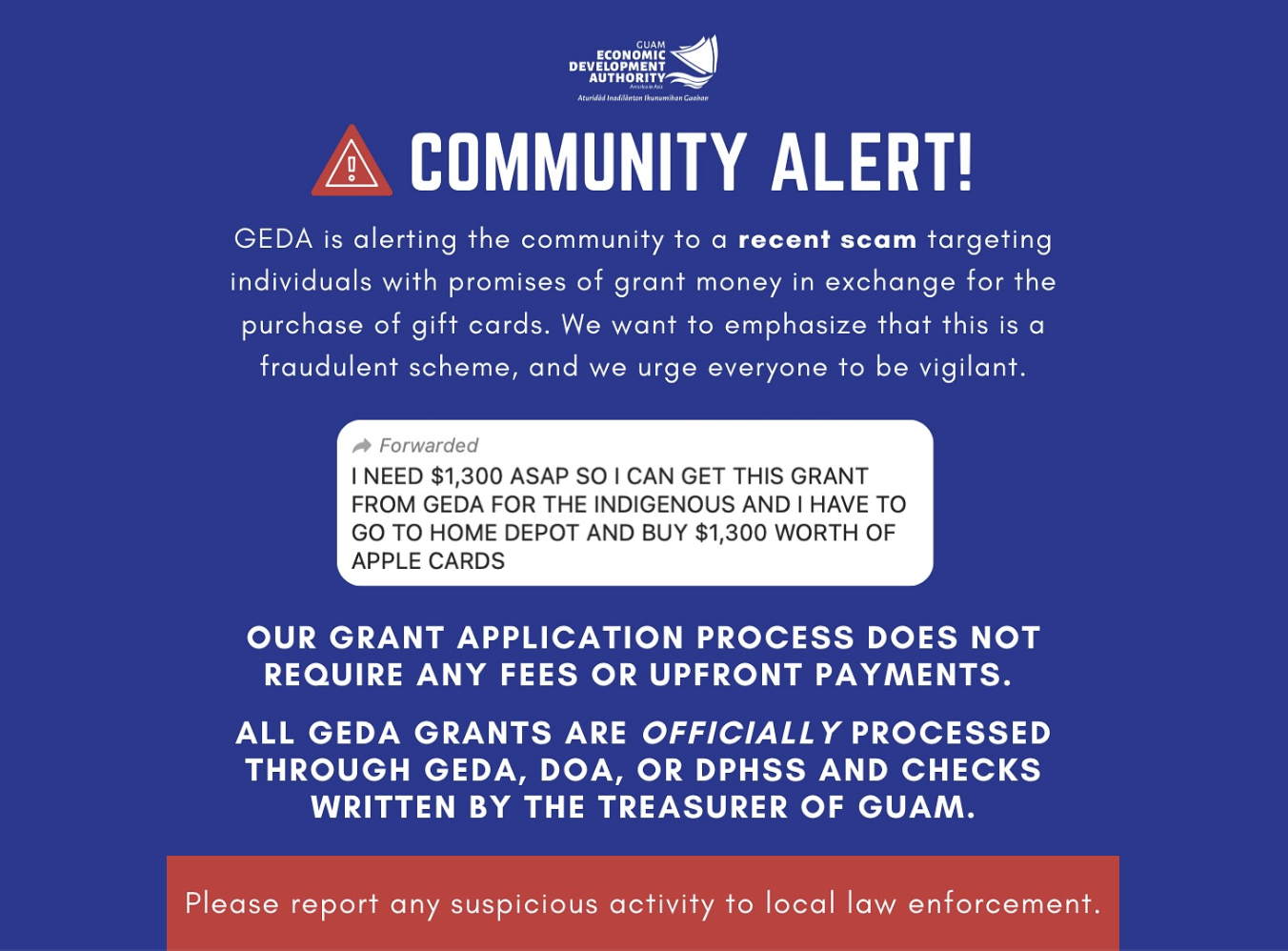The Guam Economic Development Authority alerted Guamanians on Dec. 26 to a scam where people impersonating employees call and promise grant money in exchange for the purchase of gift cards.
“We want to emphasize that this is a fraudulent scheme, and we urge everyone to be vigilant,” officials said in a press release. “Recently, our agency has received reports of individuals being contacted by someone falsely claiming to represent GEDA. This scammer instructs victims to purchase gift cards as a prerequisite to receiving grant checks.
“We want to make it absolutely clear: GEDA will never ask for any payment upfront from grant applicants,” officials stated in the release.

Officials said the application process does not require any fees, and is processed through GEDA, the Department of Administration, or the Department of Public Health and Social Services. In addition, all legitimate communications regarding grants will come directly from our official email addresses or phone numbers.
Officials encourage individuals who believe they may have been targeted in this fraudulent scheme to call local law enforcement.
They also provided the following tip: protect yourself by never sharing personal information or making payments to individuals or organizations that you do not recognize or trust.
For any questions or further information about GEDA grant programs, readers can visit them on their official website at www.investguam.com, or call 671-647-4332.
FBI officials said criminals exploit the busy shopping period and are using increasingly sophisticated tactics to steal money and personal information.
“Criminals don’t take holidays off,” Robert Tripp, FBI special agent in charge, said in a press release. "We’re seeing scammers employing aggressive and creative schemes to take advantage of the season’s generosity and high online shopping activity."
The FBI has identified several prevalent scams this holiday season, including:
1. Online shopping scams
-
Fraudulent websites or ads offering goods at unrealistic discounts.
-
Items purchased through third-party marketplaces using stolen credit cards or accounts.
-
Puppy scams involving fake advertisements for pets, with losses reported at $5.6 million so far this year.
2. Charity scams
-
Fake charities soliciting donations through phone calls, emails, crowdfunding platforms, and social media.
-
Copycat organizations mimicking legitimate charities to steal funds.
3. Cryptocurrency investment scams
-
Fraudsters posing as trusted individuals convincing victims to invest in fake cryptocurrency platforms. Losses are often substantial, with victims unable to retrieve their funds.
4. Gift card scams
-
Scammers requesting gift card purchases for alleged emergencies, work-related functions, or as payment.
-
Tampered cards with compromised security stickers or altered barcodes.
5. Social media scams
-
Posts offering fake gift cards or event tickets designed to steal personal information.
-
Fraudsters duplicating ticket barcodes for resale.
Tips to protect yourself
To avoid becoming a victim, the FBI advises the following precautions:
-
Verify websites and offers: If a deal looks too good to be true, it probably is. Avoid clicking on suspicious links or ads.
-
Secure your accounts: Use strong, unique passwords for banking, shopping, and rewards accounts.
-
Inspect gift cards: Check for signs of tampering, such as misaligned packaging or scratched-off security codes.
-
Donate wisely: Verify charities through trusted sources and avoid those soliciting donations via gift cards or wire transfers.
-
Be skeptical of requests: Government agencies or law enforcement will never demand payments via phone, email, or gift cards. mbj


















